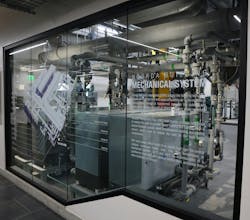Weber State University in Ogden, Utah, is focusing on sustainable campus design by combining energy efficiency and student education through an ambitious electrification project. With a goal to become carbon neutral by 2040, the university is replacing outdated HVAC systems with all-electric, all-climate heat pump technology. In the process, the university’s campus is transforming into a living laboratory.
Historically reliant on central steam and chilled water plants for heating and cooling, Weber State has taken steps to retrofit buildings with all-climate, water-source heat pump systems. Roughly half of the campus has already made the switch, and plans are underway to adopt ductless Hybrid Variable Refrigerant Flow (VRF) systems campuswide. These solutions reduce reliance on refrigerants by circulating water indoors—a key advantage in the effort to electrify and decarbonize buildings.
Innovative learning environment
One of the installations is in the Noorda Engineering, Applied Science & Technology Building, home to the university’s electrical, mechanical and energy engineering programs. There, components of the VRF system, including condensers, fan coils and branch controllers, are clearly labeled and exposed, enabling students to study and interact firsthand with the innovative technology . Hands-on access gives students real-world insights into the all-climate heat pump systems increasingly being adopted across industries.
Another key installation took place in the six-level SkySuites Complex at Stewart Stadium, home of the Weber State Wildcats football team. Completed in 2024, the project features a Hybrid VRF system that services the university's athletics department, coaching staff offices, press box, 26 suites, 150 club seats and a student-athlete study area.
Smarter, more comfortable spaces
Advantages of VRF and Hybrid VRF technology include improved comfort and efficiency provided by zoning. With zoning, each room has its own thermostat, giving occupants control to heat or cool their space to their comfort level. This enhances comfort and minimizes energy waste by enabling users to avoid heating or cooling unoccupied spaces.
Campuswide, the university has seen significant energy savings from the heat pump system—in some cases reducing the energy usage by 70% to 80%. These results translate to lower utility bills and more funding available for renewable initiatives like solar power.
Weber State has also embraced smart energy controls that optimize temperature based on occupancy and light levels.
Sustainable, energy-conscious campus
With multiple new projects in the design phase and a growing energy recovery network, Weber State is becoming a campus where sustainability, efficiency and education go hand in hand.
The university is creating an energy-conscious campus through a strategic mix of VRF and Hybrid VRF systems. Three upcoming projects will employ this solution, and plans call for expanding it campuswide. The transition to low global warming potential (GWP) refrigerants makes energy savings and overall system cost more important than ever, especially with the American Innovation and Manufacturing (AIM) Act on the horizon.
The AIM Act requires that all new commercial refrigeration equipment must use refrigerants with a low GWP by Jan. 1, 2026. This transition is designed to reduce the environmental impact of building operation. By redesigning around new refrigerants, VRF manufacturers also will improve equipment efficiency, yielding more efficient and effective heating and cooling solutions.
Weber State’s shift toward electrification, efficient HVAC systems and hands-on student engagement sets an example for higher education institutions striving to reduce their environmental impact and prepare the next generation of innovators.
Justin Owen is interim director of operations at Weber State University, where he oversees building maintenance, commissioning and sustainability. He manages the university’s revolving green fund, pursues energy rebates, manages energy upgrades to HVAC and lighting systems, calculates annual energy savings, and oversees the university’s renewable efforts.
About the Author
Justin Owen
Justin Owen is interim director of operations at Weber State University, where he oversees building maintenance, commissioning and sustainability. He manages the university’s revolving green fund, pursues energy rebates, manages energy upgrades to HVAC and lighting systems, calculates annual energy savings, and oversees the university’s renewable efforts.
